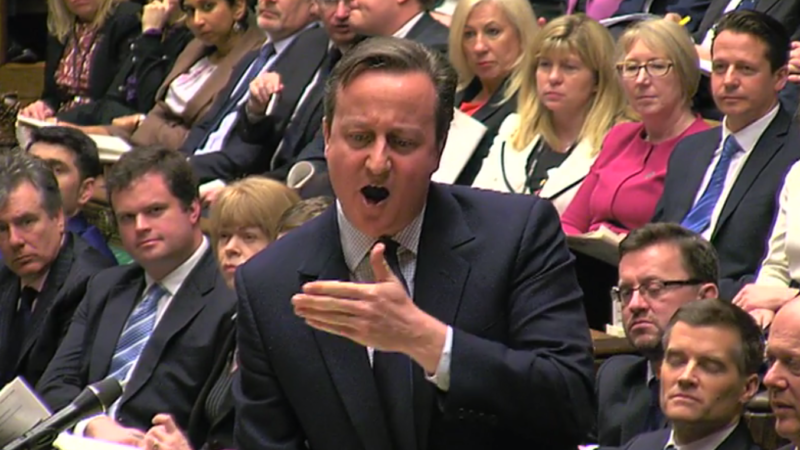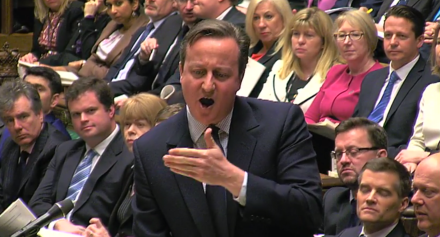

A “bunch of migrants”. That’s how David Cameron saw fit to describe refugees living in conditions so desperate few of us can even imagine. A tide of anger has spilled out on social media, and it’s well worth pointing out Cameron’s callousness in dehumanising fellow human beings. Even if it’s a “dead cat” strategy to shift the focus from the Government’s “sweetheart” deal with Google. But while most retreat to the moral high ground to look down on the PM, we should also take the time to consider how we got here.
Demonising people from abroad is no new phenomenon in British politics; Cameron’s comment is the product of virulent, and at times subtle, anti-immigration sentiment that’s been simmering for the past ten years. Politicians have whipped up anti-immigration feeling to direct public anger at anywhere other than their own dodgy dealings with companies like Google, say, or their inequality-increasing policies.
Poverty and inequality are mostly the product of governments’ wrongheaded and often questionable decisions. Why would they let the public cotton on to the full extent of that, when they could just blame migrants? It’s time for Labour to step up to the plate and set the record straight with an unashamedly pro-immigration message.
There’s a lingering idea that public opinion on immigration is uncontrollably toxic; that engaging with the immigration ‘debate’ is a dead end for Labour. Yet research from British Futures last year showed that public opinion isn’t as negative as we’re led to believe. Avoiding the topic or concocting symbolic policies to limit migrants from taking benefits most don’t even claim to begin with, doesn’t sit well with the public. It reeks of untrustworthiness, a feeling that isn’t in short supply when most are talking politics.
Labour can’t keep quiet and hope this debate will go away. So here’s my take: they need to be as bold on immigration as they are on the economy. That means a national pro-immigration message that’s woven into a broader narrative of fairness.
Anxieties and worries over immigration are very real; fears over a changing national landscape and job shortages affect the way sections of the public think about immigration. Labour should listen to these people and talk with them, like Keir Starmer is doing at the moment. That doesn’t mean accepting the stereotypes that undergird anti-immigration sentiment; those have to be countered with truths.
For Labour’s pro-immigration message to be effective and sound, it can’t – and shouldn’t – just exist in the abstract. Eloquent words and lofty numbers that reveal lies spread by xenophobic politicians or opportunistic newspaper editors can only go so far, and usually that isn’t far enough. The campaign must be local as well as national.
While extolling the economic and social positives of immigration, Labour need to make sure people from abroad are included in campaigning. Not to wheel them out for political gain but to change the debate, give them a platform to speak for themselves and challenge the entrenched idea that immigrants are wildly different from the average Briton. Too often immigrants are treated as a homogenous mass; their voices are excluded from a public conversation dominated by politicians and the media. To be seen as human beings and to chip away at negative stereotypes, people from abroad need to be given a platform.
Otherwise, the country is headed down a dangerous path. Theresa May’s unjust proposals to deport people originally from non-EU countries who don’t earn £35,000 or more after five years of living here is an example of what has increasingly become a xenophobic and economically discriminatory debate.
The poisonous discussion about immigration undoubtedly has impact on the way refugees are treated. Asylum and immigration are different but it’s not that one is good and the other is bad. Particularly as these people are depicted in startlingly similar ways: they’re routinely dehumanised and demonised. This noxious anti-‘foreigner’ climate has cleared the way for private companies on Home Office contracts to mark refugees’ homes with red doors and their bodies with wristbands. It’s this culture that clears the way for Cameron to lean on demeaning language about refugees as a distraction from his corporate love-ins that short-change the taxpayer.
Jeremy Corbyn got off on the right foot; during the leadership campaign he took a positive, sensible view on immigration, his first point of business after winning the leadership election was to speak at a pro-refugee rally in London and on visits to refugee camps in Dunkirk and Calais he called on Cameron to let the people living in these makeshift homes to the country. Corbyn is taking the morally right and politically mature view on refugees. Now this needs to be broadened out to immigration.
Once they arrive on British shores people from abroad become immigrants and little else. This suffocating label overshadows the doctors, artists, activists or carers they were before they left their homeland. This has to stop. It’s up to Labour to be on the right side of history.




More from LabourList
Ashley Dalton resigns as health minister for cancer treatment
Paul Nowak column: ‘Labour must focus on the basics’
‘Labour’s two-child cap victory rings hollow while asylum-seeking children remain in poverty’